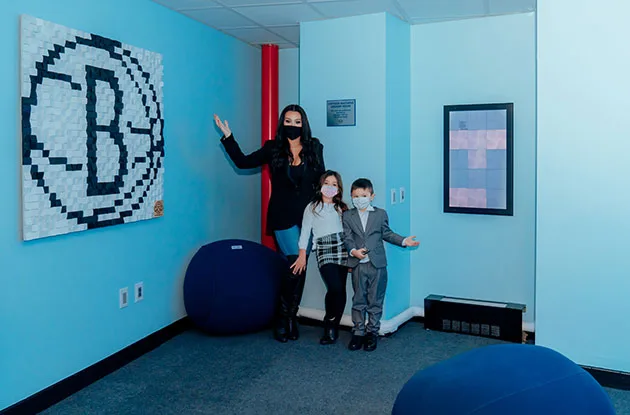Take a step back and assess your family’s technology use and take on the screen-free week challenge by turning off your TVs and iPhones to spend more time outdoors and increase quality family time.
As much as we marvel at the wonders of technology, we must also be amazed at how much time we spend with it—especially our children. Children today are not having the free-range childhood of their parents, who roamed the neighborhood, joined other children and played games until it was dark. There were no cell phones. There were no parents hovering while we made up rules and meted out consequences when the rules weren’t followed.
|
“By age 6, children spend three to four times longer with screen media than they spend reading or having someone read to them.” |
Children arrived at school better ready for success years ago—not because they had more tutors, sports leagues, music lessons, or flash cards, but because they were able to explore, imagine, pretend, and negotiate for hours on end without adult interference. Parents have more fears today about letting their children outside, but there is also the strong pull of screens to keep children inside, on the couch, exercising no more than their thumbs.
Today children are spending way too much time with screens, which include TV, computers, video games, tablets, and cell phones. This is a problem because kids are not engaging in alternative activities that are better for their healthy growth and development. Child development specialists in the 1950s warned of the perils of spending too much time with TV. Now there are a dozen different portals to connect to and limited parental knowledge about what their children are watching.
Take the Screen-Free Week Pledge
So what’s a parent to do? You can start by joining Screen-Free Week, a regional campaign presented locally by The Early Years Institute and hosted nationally by the Campaign for Commercial-Free Childhood. By signing up to take the pledge for Screen-Free Week (formerly called Turn-off TV Week) at eyi.org/screenfree, you will learn how to become screen-smart, work on reducing the time that children spend with screen-based entertainment, and instead plan alternative activities that do not involve screens. Screen-Free Week is a time to disconnect and reconnect with life.
|
Before you log off completely, use your technology to find some amazing alternatives to screens. • Visit eyi.org/screenfree to see a list of alternative activities and books to read. • Check-out The Early Years Institute’s PickaPark.org, an online resource of more than 700 parks throughout Long Island, where parents can choose a park by zip code or amenities (bathrooms, stroller accessibility, etc.) that fit their family needs. • Visit one of 5 “outdoor classrooms” open to the public on Long Island, developed in partnership with Long Island Nature Collaborative for Kids, and watch your child’s fascination and imagination come alive while playing in an all-natural play space: find links at nymetroparents.com/linck. |
You don’t need statistics to see what’s been happening. Drive behind a minivan at night and you can see one or two video screens glaring at the car seat-strapped children inside. Or go to a family restaurant and watch the 4-year-old playing video games on a hand-held device while dad is checking email on his Blackberry and mom is chatting on her cell phone.
Our children are being indoctrinated into the world of electronic entertainment at an extraordinarily young age. One in 5 babies less than a year old has a TV in the bedroom, even though the American Academy of Pediatrics recommends no screen time at all for babies under age 2. On average, preschool children ages 2 to 5 spend 32 hours a week with screen media.
By age 6, children spend three to four times longer with screen media than they spend reading or having someone read to them. By ages 8-18, children spend 7.5 hours per day with screens, an increase of 2.5 hours in the past decade. Factor in multi-tasking with all forms of screens and the total rises to 10 hours and 45 minutes a day that children spend in largely passive entertainment.
Balance Health and Happiness During Screen-Free Week Challenge
The early years set the stage for competence and confidence throughout life. That’s why children should spend as much time as possible in activities that stimulate learning and prepare them for success in school and life. Research shows that screen habits in the preschool years can lead to teen addiction down the road that can be harmful to school achievement, emotional maturity, health, and happiness. The more screen-time hours consumed by school-age children, the poorer are their grades in school and the lower their graduation rates.
Health effects of screen time include increased childhood obesity, sleep disturbances, and increased attention span issues. Studies also show that children who consume two or more hours of daily screen time are more likely to have increased hyperactivity, emotional problems, and difficulties with peers. The corollary is also true: Children who spend less time with media reap enormous benefits. They tend to get better grades, feel more personal contentment, have increased powers of concentration and improved problem-solving skills, and demonstrate increased compassion and curiosity about the world around them.
The most important thing you can do during this week is to take a family audit. First, evaluate media usage. Look at who, how, when, where, and why media is used. Then, develop family guidelines with all members of the family. Think about limiting screen time to specific days and times and turning off TV and media during meals. Finally, discuss media with your children. Talk about what is good and bad. Pay attention to the news stories you have on and explain them if children saw them. Talk about fantasy versus reality. Point out commercials and show how they are separate from the show. Ask questions about their favorite character and how they feel. Discuss how problems were solved, and how they would solve it.
There’s a whole world beyond screens waiting for your children—what will they do with it?





















